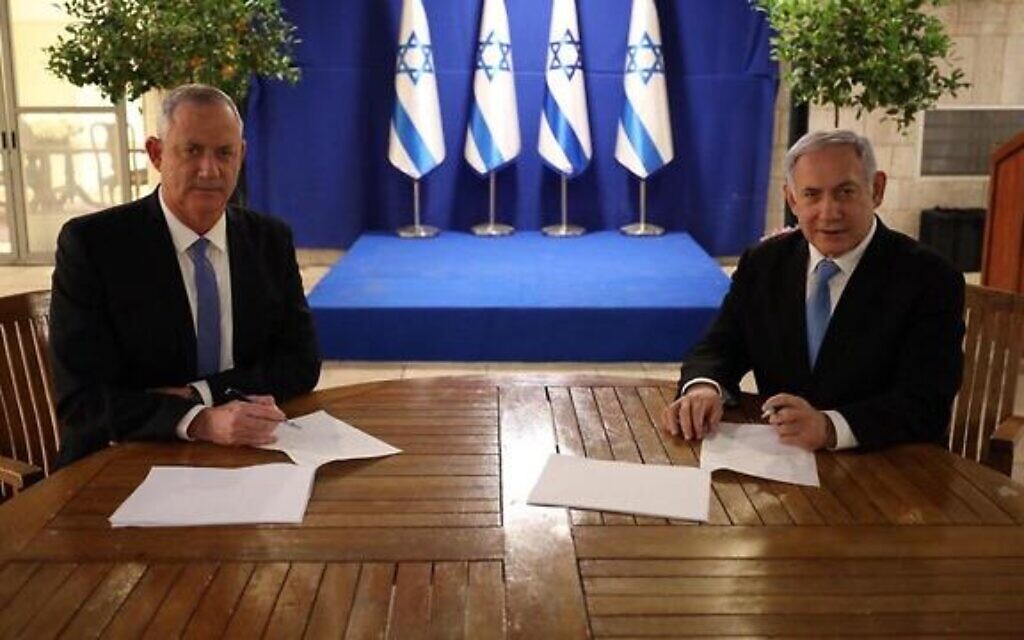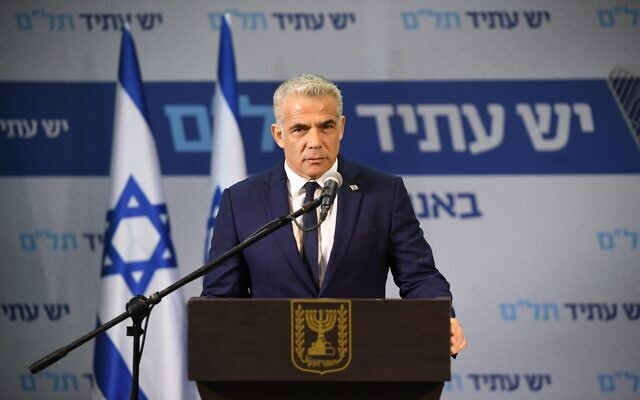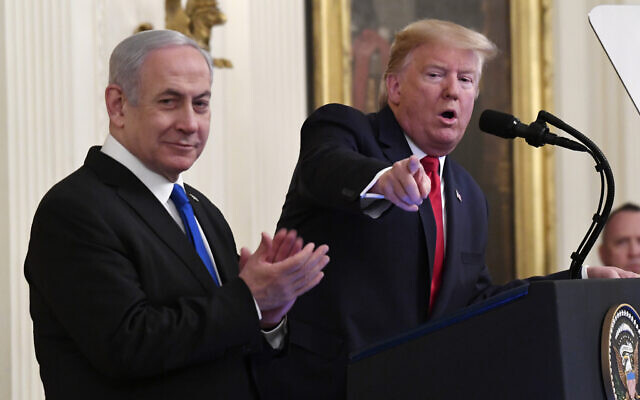If the emergency unity government is indeed sworn in, Israel will have been spared its fourth elections in 16 months. But what does the coalition stand for? And will it hold?
Blue and White leader Benny Gantz (left) and Prime Minister Benjamin Netanyahu sign their unity government agreement on April 20, 2020. (GPO)
Week after week amid the coronavirus pandemic, Prime Minister Benjamin Netanyahu called for an emergency unity government to help battle the crisis. On March 26, his three-time election rival Benny Gantz heeded the call, and on Monday night, after protracted on-and-off negotiations, the two men signed a 41-clause coalition deal. If their government is approved by the Knesset in the coming days, as anticipated, Israel’s 16-month political deadlock will have finally been broken, and the country will have been spared a fourth round of elections amid the pandemic.
Snap opinion polls suggest most of the Israeli public is pleased by the prospect of finally having a fully functioning government, but does not widely believe Likud leader Netanyahu will actually go through with a central feature of the deal — handing over the prime minister’s post to Gantz after 18 months of the coalition’s scheduled three-year lifespan. There is also mounting criticism of the size of the incoming government — projected to number 32 ministers at first, and grow to 36, with up to 16 deputy ministers, which would make it the largest in Israel’s history.
Gantz’s erstwhile partner Yair Lapid, horrified that Gantz abandoned the three-time electoral pledge not to sit in government with Netanyahu so long as the prime minister is under criminal indictment, on Tuesday also claimed that the alliance would enable Netanyahu to evade investigation in several other potential scandals, that it represents a capitulation to ultra-Orthodox coercion, that it will further weaken the rule of law and democracy, and that it will not last long. Minutes later, in a speech of his own, Gantz acknowledged that the partnership with Netanyahu was less than ideal, but reiterated his conviction that it benefits Israel’s wider national interests.
Which of them is right? Did Gantz negotiate effectively? Will the High Court strike the deal down? Is Netanyahu really going to hand over power?
What follows is an attempt to answer these and other key questions.
Why is the government going to be so large?
When Gantz decided to abandon Blue and White’s core political pledge and enter unity talks with Netanyahu in late March, he was in a position of relative strength. He had been recommended as prime minister by 61 of the Knesset’s 120 MKs and headed a 33-strong party. He thus demanded equal representation across the government for his allies.
Yesh Atid-Telem leader Yair Lapid gives a statement to the press on April 21, 2020. (Elad Guttman/Yesh Atid-Telem)
His political volte-face, however, cost him his partnerships with Yair Lapid’s Yesh Atid and part of Moshe Ya’alon’s Telem. As they now head to the opposition, his Blue and White numbers only 15 MKs, bolstered by Zvi Hauser and Yoaz Hendel (ex-Telem, now rebranded as the Derech Eretz faction) and Labor’s Amir Peretz and Itzik Shmuli), but that has not impacted the principle of an equal number of roles for the Netanyahu bloc and the Gantz bloc in the coalition.
Since Netanyahu wanted to avoid alienating too many senior members of his right-wing/ultra-Orthodox bloc, many of whom were ministers in the outgoing government and don’t want to lose that status, the deal provides for an unprecedentedly large, and costly, cabinet.
This contortion will involve the manufacture of numerous new and revived ministries without which Israel has somehow hitherto managed, all with their own offices, directors-general and support staff, at a cost of hundreds of millions of shekels — spending that innumerable commentators have termed scandalous and outrageous at a time of economic crisis, with unemployment running at 25% and rising.
Attracting further criticism, the deal provides for an official residence for the “alternate prime minister” — the new title that is to be bestowed upon Gantz in the first 18 months and Netanyahu in the second 18 months — even though Gantz has been insisting he has no desire or need for it, and even though the existence of such a clause in the deal was repeatedly denied until the accord was published late Monday.
Is this truly an “emergency” government, as it is called in the deal, set up first and foremost to tackle the pandemic?
Well, yes and no. The deal provides for a six-month emergency government focused first and foremost on the COVID-19 crisis. However, the fact that it took more than three weeks to negotiate — during which Netanyahu has led a generally praised Israeli response to the pandemic, with the national death toll relatively low — somewhat belies the “emergency” designation.
Prime Minister Benjamin Netanyahu, Health Minister Yaakov Litzman (C) and Health Ministry Director General Moshe Bar Siman-Tov at a press conference about the coronavirus COVID-19, at the Prime Minister’s Office in Jerusalem on March 11, 2020. (Flash90)
Furthermore, while the deal rules out the introduction of major legislation on non-virus matters in those first six months, it makes an exception for the issue of West Bank annexation. Netanyahu is free to advance moves toward unilateral annexation, on the basis of the Trump “Peace to Prosperity” vision, from July 1.
The deal provides for the six month “emergency” period to be extended if agreed to by the parties; during the course of the emergency period, they are supposed to negotiate on the platform and principles of their post-emergency coalition.
Lapid charged Tuesday that Gantz has surrendered to Netanyahu and the ultra-Orthodox, and undermined the rule of law. Gantz insists that’s not the case. Who’s right?
The accord freezes major appointments for the first six months — meaning that no new police chief will be appointed, for instance, and that key appointments in the state prosecution will not be made, leaving several senior posts filled by temporary appointees made by Netanyahu loyalist outgoing Justice Minister Amir Ohana in place. The spot on the judge-selecting panel hitherto reserved for a member of the opposition has instead been promised to Hauser — a right-leaning former Netanyahu cabinet secretary — essentially granting the right veto power in the appointment of judges.
Years of efforts by Lapid and Yisrael Beytenu chief Avigdor Liberman to raise the number of ultra-Orthodox males conscripted into the IDF, and other national service initiatives for the ultra-Orthodox and Arab communities, are highly unlikely to progress in the new government since the deal provides for decisions on matters such as Haredi conscription to be made by the government rather than the Knesset.
The two ultra-Orthodox parties, Shas and United Torah Judaism, are set to retain their influence and leverage in the new government constellation — with UTJ’s Yaakov Litzman likely to stay on as health minister despite widespread criticism of his performance — and will thus be able to thwart efforts to change the status quo on such issues as Shabbat or advance the status of non-Orthodox Judaism.
Interior Affairs Minister Aryeh Deri, left, speaks with Health Minister Yaakov Litzman during a meeting in Jerusalem, March 4, 2020. (Yonatan Sindel/Flash90)
What happens to the coalition if, as Netanyahu fears, the High Court of Justice intervenes to disqualify him from setting up the new government because he has been indicted?
The court has hitherto refused to rule on petitions to this effect, arguing that the situation was theoretical. As of Monday night, the situation is no longer theoretical. Were the court to disqualify Netanyahu as prime minister, the agreement is clear and specific about how this would impact the new government in its first six months: there would be new elections.
Attorney General Avichai Mandelblit (L) and Supreme Court Chief Justice Esther Hayut at Bar Ilan University on March 4, 2020. (Flash90)
The agreement is not definitive on what would happen in the relatively unlikely event that the court were to issue a ruling after that period. It certainly does not specify that new elections would be held in such a circumstance. It may be that this is a situation the framers of the deal neglected or chose not to address definitively. Either way, it’s a gray area.
Has Gantz locked Netanyahu into handing over power, as promised, after 18 months?
Not exactly. If Netanyahu wants to avoid “rotation” — handing over to Gantz — he can try to get a law passed to dissolve the Knesset and hold new elections. Were he to do so, however, the deal essentially stipulates that Gantz would take over immediately as prime minister, and would hold the post in the three-month run-up to the elections and until a new government is formed — for a likely total of five or six months.
That may not sound like much of a deterrent to Netanyahu: He could decide, whenever he judges his re-election prospects to be brightest, that he’s not going to hand over to Gantz. There would be new elections. He would have to step down as prime minister temporarily, but he would presumably be betting he would be back in power in less than six months. If he goes through with the rotation, by contrast, he would be out of office for 18 months at a minimum.
Gantz theoretically could have pushed for a more radical deterrent. But ultimately, there is no possible language in any political agreement that can be airtight. The bottom line is that these agreements have to be built on some basis of trust.
Is the High Court likely to intervene on any of this?
Nobody knows for sure. A host of petitions have been lodged with the court — on a range of issues including Netanyahu’s fitness to set up a government while under indictment, and the amendments required to Israel’s quasi-constitutional Basic Laws for some clauses of the deal. The clause essentially providing for Gantz to become prime minister of a transitional government if Netanyahu tries to avoid rotation by forcing new elections, for instance, contradicts the current law, under which the prime minister on the day the Knesset dissolves remains prime minister during the election period and until a new government is formed.
In what is regarded as the highly delicate balance between the judiciary and the executive, many legal experts consider aspects of the deal to be unconstitutional but do not think this means the justices will necessarily intervene; there is precedent for the High Court declining to intervene when petitioned over political agreements.
More radical measures that Gantz could have sought to try to lock Netanyahu into rotation, some experts say, might have pushed the judges to act. Theoretically, Gantz could have sought to bar Netanyahu from running again if he reneged on rotation by dissolving the Knesset and calling elections, or sought to prolong the period before those elections, but such moves might have been regarded by the High Court as so radically unconstitutional as to necessitate its intervention.
US President Donald Trump (right) during an event with Prime Minister Benjamin Netanyahu in the East Room of the White House in Washington, to announce the Trump administration’s much-anticipated plan to resolve the Israeli-Palestinian conflict, January 28, 2020. (AP Photo/Susan Walsh)
Gantz has backed the Trump peace plan, but says it should be utilized as a basis for negotiations with other affected parties, such as the Palestinians and Jordan. Has he assured himself of veto power on Netanyahu’s declared goal of unilaterally extending Israeli sovereignty, under the provisions of the plan, to all of the settlements, the Jordan Valley and potentially other West Bank areas?
Apparently not. As of July 1, Netanyahu can hold a vote, in the government and/or the Knesset, on unilaterally extending Israeli sovereignty into the West Bank. It’s not definitively clear from the agreement’s disparate clauses whether Gantz and his allies are free to vote against such a move, in line with his position that annexation should not be unilateral, but they are definitively not allowed to try to block or delay a vote on such annexation, and almost certainly wouldn’t have the numbers in the Knesset to stop it.
Is this the coalition Netanyahu wanted?
Netanyahu may well feel that he’s signed a pretty good deal. He gets to stay in office — a far better place than the opposition from which to battle the corruption charges against him.
There’ll be elections if the High Court tries to disqualify him, in which he could run on a platform promising legislation to heed the will of the people by overriding the court.
The deal offers him potential paths to avoid rotation 18 months on, and the deal’s clauses on rotation are likely not legally enforceable anyway.
He can advance annexation.
He may have rid himself of the Yamina party headed by Naftali Bennett, with whom he has a famously strained relationship, or he could bring in Yamina on humiliatingly disadvantageous terms.
His appointee will be Knesset speaker throughout the life of the coalition, in part because Gantz neglected to demand that the post revert to Blue and White when/if he takes over as prime minister.
Gantz’s decision to join forces with him brought about the collapse of Blue and White as a potent force that nearly ousted him in three elections.
Chairman of the Labor party Amir Peretz is seen during a press conference in Tel Aviv, March 12, 2020. (Tomer Neuberg/Flash90)
Likud was reportedly trying to woo Labor’s Peretz and Shmuli into a coalition, without Gantz, as recently as Sunday — offering the duo five ministries and Peretz an eventual spell as prime minister. But such a narrow coalition, if Netanyahu was indeed seeking it, would have been highly unstable. The coalition with Gantz could collapse too, as Lapid predicted Tuesday it soon would, but Gantz has no obvious political place to go should he decide to break the alliance, and every interest in maintaining the partnership so long as the premiership is theoretically waiting for him.
Will Netanyahu indeed hand over power in fall 2021?
A Tuesday night poll found only 31% of respondents think he will.
“Never… Mark my words!” insisted former prime minister, and former Netanyahu defense minister, Ehud Barak the same evening.
“Absolutely,” countered Shas’s Aryeh Deri minutes later.










@ Ted Belman:
The way I understand it the right will be able to block any judicial appointment they do not like.
@ Reader:
“Aye, there’s the rub.”
@ Ted Belman:
As long as they don’t sign on the dotted line that the other 70% will be ceded to the new “Palestinian” state.
Then I am OK with it, too.
@ Reader:
The most important thing is clearing the way for the annexation.The second most impoortant thing is the appointment of judges. This was sacrificed somewhat to secure the annexation. All in all I am OK with it.
Based on the Arutz7 article “Unity agreement signed: National Unity government to be formed”, it looks like the agreement gave Blue/White the most important ministries.
“Blue and White will receive the defense, justice, economy, welfare, immigration and absorption, culture and sports, communications, tourism, social equality, diaspora, agriculture and strategic affairs portfolios.”
The power over ministries will be taken away from the prime-minister and given to the heads of the factions who have the portfolios. (The article apparently has been edited and this info was removed). Will most of the power end up in the hands of Blue/White while Netanyahu formally gets to be prime-minister for 18 months?
80% of the Likud polled said they are pleased by the coalition. So Bibi is not at all diminished and appears to have won a political victory given the circumstances.
Assuming Israel applies sovereignty in Judea/Samaria in July as the coalition agreement allows this will be a huge step forward. Land were sovereignty is applied is no longer subject to the Defense Department and the Defense Minister rulings. In other words building and land matters will applied by Israeli Civil Law just like anywhere in Israel.
In other words Gantz will have no power to stop building in Judea/Samaria areas were Israeli sovereignty is applied.
Blue/White have now permanently split and Lapid and Gantz are completely at each other’s throats. So the Likud is now the one and only large party. Gantz will not want the unity deal to fall apart because he would be in a far worse position if new elections came about, so the Likud will have leverage in this unity government, especially if they can convince Yamina to join the government.
Yes, giving Blue/White so many important ministries is far from idea but Israelis did not want a fourth election. Also the time frame for sovereignty application might have run out under Trump’s watch, as it is unknown if he will win re-election.